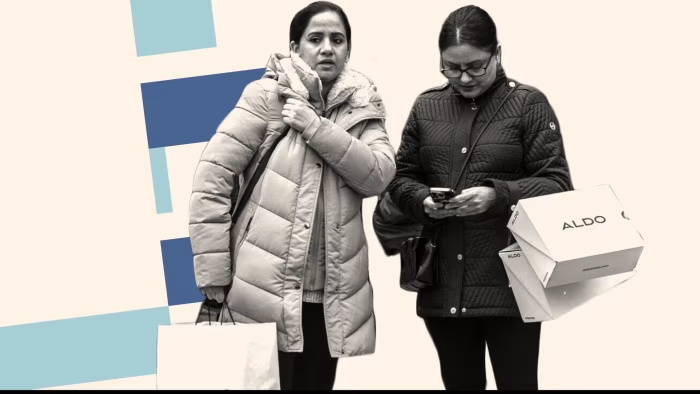Unlock the Editor’s Digest for free
Roula Khalaf, Editor of the FT, selects her favourite stories in this weekly newsletter.
UK consumers have curbed spending more than anywhere else in the G7 since the pandemic, as high interest rates and fear of economic shocks prompt households to build up savings rather than splashing out.
Since the start of the Covid pandemic in 2020, UK household spending has risen just 1 per cent in real terms and fallen 3 per cent on a per capita basis, even as inflation has fuelled nominal spending.
In contrast, per capita spending rose 12.7 per cent in the US, 5 per cent in Japan and 3.2 per cent in Italy over the same period. Even in Germany, where consumers have also retrenched, it has inched up 0.2 per cent.
This caution is out of character for British consumers, whose spending accounts for some two-thirds of GDP and grew solidly in the six years leading up to Covid outbreak.
It is puzzling economists, because households’ disposable income has been growing, even after taking account of inflation and a rising tax burden.
But instead of spending these gains, households have been stashing them away. The saving ratio, which edged up to 10.7 per cent in the second quarter, has been stuck in double digits for the past year — well above its 2016-19 average of 5.6 per cent.
Deciphering this puzzle is a priority for policymakers at the Bank of England. If consumers do not start spending soon, the central bank will need to rethink its growth and inflation forecasts, with implications for the path of interest rates.
“We have persistently projected the saving ratio to fall, but we are yet to see this play out in a sustained way,” Catherine Mann, a BoE rate-setter, said last week, calling it a “large judgment call” that made the outlook for UK GDP unusually uncertain.
A pick-up in savings after the BoE started raising interest rates aggressively in 2022 was to be expected, economists say. People with cash to spare piled into Isas and other savings products offering better returns than they had for years. Meanwhile, homeowners facing steep increases in the cost of their mortgages scrimped in order to pay down as much debt as possible before refinancing.
But this effect “should be fading”, said Paul Dales, chief UK economist at the consultancy Capital Economics. He now wonders if there has been a more structural shift in behaviour, with people becoming more inclined to build buffers for a rainy day.
“It is something that a lot of people on the Monetary Policy Committee think about,” Clare Lombardelli, a BoE deputy director, said last month. “We have to be very alive to the risks of demand deteriorating. I think there is a particular risk in the consumption-savings mix.”
Understanding what drives the savings ratio is difficult, because the number is derived from estimates of household income and spending that have been subject to larger revisions than usual since the pandemic. The latest estimates show consumers spent more and saved less than previously thought in 2022, but then retrenched in 2023 and 2024.
Mann suggested one reason this precautionary behaviour had become more entrenched in the UK than elsewhere was because the inflationary shock had also been much greater.
“UK households have experienced 12 years of inflation in a little over two years . . . the cumulative increase in the price level does not just ‘wash out’ of the consumer psyche when inflation returns to target,” she said, citing evidence that consumers had become more price-sensitive, especially in areas of discretionary spending like hotels and restaurants.
But Michael Saunders, an adviser at the consultancy Oxford Economics, said this “scarring” effect from high inflation was unlikely to be the main reason consumers were holding back.
“Inflation uncertainty is probably a small part,” he said. “Economic uncertainty is high . . . people are worried about jobs, about the impact of AI, about tax . . . The only thing you know about your taxes is they’re going up.”
Longer-term demographic trends may also be contributing. Older people are more inclined to save, and Saunders noted that young people aspiring to buy a first property now needed to set more money aside to build up a deposit.
Kallum Pickering, chief economist at Peel Hunt, offers a further reason why UK consumers have lost their exuberance: they feel less wealthy, after a three-year period in which lower bond prices have hit pension portfolios, and house prices have stagnated in real terms.
“We’ve not got people bragging after a dinner party on a Friday night that their house price has gone up by £25,000 and it’s the right time to do the roof extension,” he said.
Data visualisation by Keith Fray

